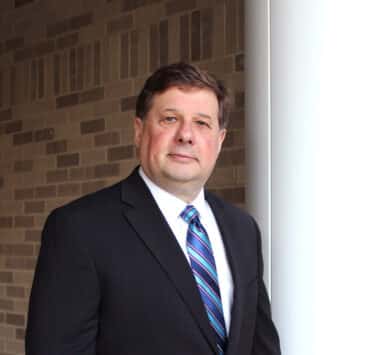Nic Riesenberg remembers rising before the sun climbed over the hills in rural Iowa. Mornings were an important time on the family farm. As the youngest of thirteen children, he understood the need to contribute at an early age. Each day, Riesenberg had meaningful work to do. He fed the animals, watered crops, fixed equipment, and helped cook breakfast—all before the start of the school day.
Today, the vice president of facilities and support services at North Kansas City Hospital (NKCH) manages the hardworking teams keeping the provider operational. Riesenberg oversees employees in environmental services, food and nutrition, maintenance, construction, and real estate. Together, they clean 500 rooms per day, serve 1,000,000 meals each year, and maintain 1.8 million-square-feet of space.
The habits Riesenberg learned on the farm have stayed with him throughout his entire career. While he may not be doing physical labor fourteen hours a day, he’s still waking at sunrise and covering a lot of ground. He arrives early each morning and starts his workday rounding throughout as the hospital opens.
“As the youngest in a large family, you learn to listen a lot,” he reflects. “That’s what I do. I walk around. People talk, and I listen, and hopefully we can solve big problems together.”
“The more we build community, the more people go above and beyond to help.”
Nic Riesenberg
During rounds, he asks his colleagues how they are doing, what challenges they face, and what tools might improve overall output. Most importantly, he’s getting to know people, strengthening culture, and creating community. “The more we build community, the more people go above and beyond to help,” he explains.
Riesenberg’s upbringing gave him a passion for finding creative ways to increase efficiency. That interest led him to study construction engineering at Iowa State University, before starting his career as a carpenter and project engineer. Not long after, the young professional began heading large teams working on multimillion-dollar, high-rise projects.
The importance of strong leadership is something Riesenberg knows first-hand. While his dad was a self-taught farmer and bus driver, his mom assisted people with disabilities. They were both hard workers who lacked mentors. “I’ve seen people struggle and teams fail because they need better managers,” he says.
In 2010, after deepening his expertise and stepping into roles of increasing responsibility, Riesenberg transitioned into healthcare as a facilities manager at the University of Kansas Hospital. Working with administrators and department heads in an active hospital setting to make clinicians more efficient opened his eyes to the potential of using his background to impact patient care.
“I enjoy working in healthcare because it’s a challenging and important environment, where customer service and quality really matter,” he says.
Riesenberg joined NKCH in 2019 and started analyzing an ongoing master plan, while developing new standards and processes. A quick promotion to his current role entrusts him to ensure facilities and support services teams collaborate with all other hospital departments, as much as possible.
“Teams in healthcare settings can sometimes default to staying within boundaries that limit them, when thinking in new ways can help the hospital accomplish more,” he explains. In times when teams are stretched thin and administrators need to do more with less, Riesenberg reconfigures teams, enhances communication, and blurs the lines of responsibility.
“A facilities and support services worker can either focus on completing just one task as quickly as possible, or they can get in the habit of looking to meet unspoken needs.”
Nic Riesenberg
He encourages and expects each team member to work outside of a traditional or narrow job description, leading by example. It’s not uncommon to see Riesenberg lending a hand, or his empowered employees deviating from assigned duties to serve patients, families, and each other. All knowing and trusting the full support from the NKCH leaders.
“A facilities and support services worker can either focus on completing just one task as quickly as possible, or they can get in the habit of looking multiple steps ahead and impacting care,” Riesenberg says.
Once, while cleaning a room, a housekeeper intervened and saved the life of a choking patient. Similarly, support services staff frequently respond when passing rooms with sounding alarms alerting that patients are attempting to get out of bed. “If our workers simply talk to patients and stall for a few seconds before nurses arrive, we’ve helped prevent a fall,” Riesenberg says.
His most recent rounds demonstrated the hospital’s culture in action. Walking into the cafeteria, he noticed a room service supervisor and several of her teammates filling in as cashiers when the food and nutrition team was missing five employees during the shift. Workers didn’t panic or even report the problem to leaders and wait for a response. They simply saw the need, figured out an immediate solution, and solved the problem without interrupting service to guests.
When the hard work was over and the long day ended on the family farm, Nic Riesenberg usually ran around with his siblings or played basketball. At NKCH, it’s one of the few moments of quiet in his office. The VP logs into his computer and spends some time catching up on emails. As he pulls out of the parking lot, he scans the buildings and campus to make sure everything is in order. The sun starts to dip below the horizon. Riesenberg sighs and heads home content, but ready for more.
The hard work may be over, but the midwestern farm kid knows another day is coming.


